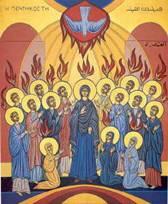Beginnings: Pentecost
UNIT 1: THE BEGINNINGS
Objective: Students should be able to discuss the beginnings of the Christian era, its place in the Roman world, the major players at the first council, the debate about Jews and Gentiles and its conclusion, the foundation of the sacraments of baptism and chrismation.
WEEK 1: PENTECOST
 Begin with a discussion of the phrase “in the fullness of time”:
Begin with a discussion of the phrase “in the fullness of time”:
- God had prepared His people, the people of Israel, for the coming of the Messiah. Abraham was chosen out of Ur and led to the Holy Land. His descendants were saved from starvation by Joseph. Moses led the people of Israel out of Egypt and received the Law and the 10 Commandments. Joshua took the land of Israel back from the Canaanites. David, the King, anointed by Samuel the prophet, brought back the glory of Israel and its golden age under his son Solomon with the holy temple. A multitude of prophets through the years called the people back to the Lord and His Law. The prophets foretold the Messiah and, in Jesus, all the prophecies were fulfilled. Have each student, in 5 minutes, take one of these Old Testament greats and prepare to tell his or her story and how he or she fit into the plan of God for His people and His preparation for the ministry of His Son:
Abraham Joshua Solomon The 3 youths in the fire
Joseph Ruth Isaiah Daniel
Moses David Jonah
By the days of the Romans, Jewish immigrants had settled all over the Empire, bringing with them synagogues. At Pentecost, the total population of Jerusalem was about 50,000, but 125,000 pilgrims came for the feast. All Jewish believers hoped to be in Jerusalem for the great feasts. The city was full of colorful crowds, speaking all the languages of the world.
- The gods of Rome were found wanting; Jupiter, Juno, Mars, Neptune, etc., with their extensive mythology were capricious and uncaring. Not even most Romans believed in their gods anymore. Many Greek and Roman people had already heard of the Jewish religion and were interested; some had even been circumcised.
- The Roman Empire provided a stable political and cultural climate:
The Empire stretched from Britain to Northern Africa to Syria and Judea. Only Persia and the Germanic tribes remained a factor at the borders. Use your classroom or study Bible map to show the borders of the Empire. A network of roads and postal service covered the entire Empire. Travel had never before been easier. Ask students to compare with earlier transportation and today’s. One language/one culture – educated people everywhere spoke Greek (not Latin); one set of laws, of coinage, of trade made the work of the apostles easier. Jerusalem itself was under Roman rule with a Roman governor and Roman soldiers at the time of Pentecost. Can you locate Jerusalem on your map?
Now consider the arrival of the feast of Pentecost in this milieu:
- Review the icon; what do they already understand? The disciples are gathered in the upper room (What last happened there? The Last Supper), in some icons each has a flame above his head (Why?), the book of the Gospels sits in the center, by which the Holy Spirit has revealed the spiritual presence of Christ to the world, the little crowned figure seated in the middle is the world! There is an empty place at the top of the horseshoe formed by the apostles; who will fill this place at the Second Coming? The icon shows only 12 apostles; how many believers were actually there?
- Scripture readings: Acts 2:1-8, 14-15, 36-47. Read these out loud in class.
- Discussion questions:
What happened at Pentecost? Did the apostles obey Jesus’s commandment to “Go forth and preach”? Who descended? Who is the Holy Spirit? In what sacrament do we receive the Holy Spirit? (Chrismation) How does the Spirit, God Himself, dwell in us? How can we tell He does – did we see tongues of fire? This is a great mystery, as are all the sacraments. Why is He called “Comforter”? In our prayer, “O heavenly King” we ask the Holy Spirit to come, why? (Jesus commanded us in Luke 11: 9-13.)
What is speaking in tongues? (speaking in other languages as the apostles did at Pentecost) How is this different from the tower of Babel? (Here we see harmony and subjection to God’s action; there we see confusion and disunity from an attempt by man to reach God by his own means, resulting in hatred, racism, and war.)
Why were there so many Jews in Jerusalem from all over the world at that time (50 days after Passover) anyway? (They are also celebrating Pentecost, the giving of the Law 50 days after Passover on Mt. Sinai; it is also the “Feast of Weeks” and the thanksgiving for the harvest) So the Old Covenant Pentecost, the Law, is supplanted by the New Covenant Pentecost, the Spirit (See Jeremiah 31:31-34).
- In what way could Pentecost be called the birthday of the Church? How many people were baptized at Pentecost? Describe the life of the very first Church in Jerusalem from Acts 2:42-47 (already read). Compare and contrast with your experience in your Church today. Read Acts 5:1-11 – why were Ananias and Sapphira punished so severely? Read Acts 6:1-7: What is the role of a deacon today?
Quiz Questions:
- Name at least 5 Old Testament characters who helped prepare the Jewish people for the coming of the Messiah.
- List at least 5 characteristics of the Roman Empire that made the spread of the Gospel easier.
- Name the twelve apostles. How did Matthias join the others?
- Answer the who, what, when, where, how of Pentecost.
- List at least 3 characteristics of that first Church in Jerusalem.